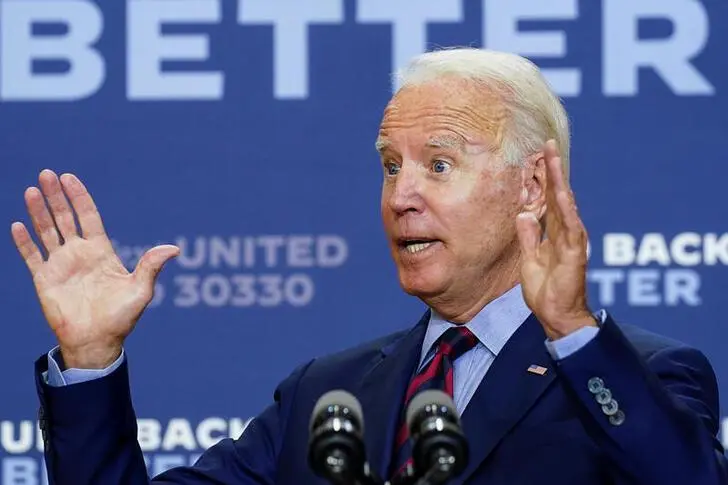PHOTO
In the wake of the Democratic National Convention, Joe Biden’s favorability rating rose to about 45 percent. The announcement of Kamala Harris as a running mate — plus the vocal approval of three previous presidents — gave a much-needed boost to his campaign.
Though President Donald Trump does have a significant core base of supporters, the week following the party conventions has shown that the election is not a fait accompli. With the race far from over, decision-makers in Gulf states would be prudent to assess the foreign policy implications of a Biden administration.
In addition to serving as vice president, often deputizing for President Barack Obama in sensitive international matters, Biden has a lengthy track record in foreign affairs. As a long-time member of the US Senate Committee on Foreign Relations, including as its chairman, Biden’s liberal internationalist agenda became an important facet of his politics.
Similarly, his long tenure means that the presidential hopeful has relationships with many leaders in the Middle East with whom Trump has remained transactional at best.
Like many from the post-war generation, Biden’s vision is that of a muscular America that supports its allies in the face of adversity, while maintaining the international order. This is at odds with Trump’s isolationist sentiment.
Where Trump has sought to rewrite America’s role in the world, at times with an attitude deemed complacent by its allies, a Biden administration can be expected to attempt to revert to strengthening the post-1945 status quo in the face of new challenges.
Trump has gone to great lengths to paint Biden’s vice presidency as a list of foreign policy failures, but the reality is that his election would, in the eyes of many, lead to a return of normalcy in US foreign policy. As he is an Obama era politician, many interpret this as meaning a further reduction in US involvement in the Middle East, especially military engagement.
A possible exception to this, which would be the one area of concern for Gulf states, is a return to proactive reengagement with Iran. Trump, having trashed the Obama administration’s foreign policy triumph of the Joint Comprehensive Plan of Action (JCPOA), has left the Iranian regime out on a limb, with good cause to act as a rogue once again.
Biden has made no secret of his intention to enter into negotiations with Tehran, according to Chris Ruddy, a Trump confidante and CEO of Newsmax. “A Biden administration will be more sympathetic to Iran. Expect an immediate return of the JCPOA and a more Obama-esque approach to the region,” he said.
While Trump has attempted to highlight his own decisiveness, citing his role in the assassination of Islamic Revolutionary Guard Corps leader Qassem Soleimani, he has also sought to paint his rival as a dithering potential commander-in-chief. He points out that Biden voted for the Iraq war despite widespread objections from his Democratic colleagues, and yet was reticent about the planned assassination of Osama Bin Laden in 2011. Trump supporters have seized on this as evidence of Biden’s unsuitability for the office of president.
Despite being clear in his objection to “forever wars” such as the engagements in Afghanistan and Iraq, it is unlikely that Biden would seek to completely overhaul US relationships overseas.
According to US Special Operation Command’s Col. David Des Roches: “In the past, US military policy toward the Middle East has been remarkably resistant to domestic political change. In large part, this reflects the fact that Americans tend to consider the Middle East as a security obligation, rather than a security opportunity.”
The Gulf states need not be concerned about their status as US allies under Biden, or any other administration, while they remain important to maintaining international energy security.
Though Biden’s foreign policy views were formed decades ago, Des Roches is right to point out that “the Democratic party which Biden leads has moved significantly to the left since the Obama years.” The effect of this is that Biden might have to adapt his policies and stances toward erstwhile allies to maintain consensus within his Cabinet.
The office of commander-in-chief is a lonely one and we know little of what policies Biden might be expected to implement. The one certainty is that he would support a return to Obama’s agreement with Iran — perhaps with greater success, given the pressure Trump-era sanctions have placed on the Iranian regime.
However, “what will not change is the general security assistance and conflict-prevention posture of US forces in the Gulf,” as Des Roches points out. The reality of the post-1945 status quo is a global system in which the US has overwhelming global military superiority, giving it the ability to act irrespective of changes in leadership elsewhere; US military spending is, in fact, increasing.
Regardless of concerns in Washington, the fact is that the most important, central facet of the durability of Gulf states has been US military support — and so the election of either candidate will be welcomed without hesitation.
- Zaid M. Belbagi is a political commentator and an adviser to private clients between London and the Gulf Cooperation Council. Twitter: @Moulay_Zaid
Copyright: Arab News © 2020 All rights reserved. Provided by SyndiGate Media Inc. (Syndigate.info).





















